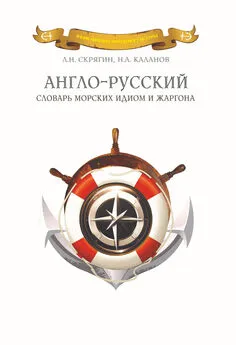Adam Makkai - Словарь американских идиом: 8000 единиц
- Название:Словарь американских идиом: 8000 единиц
- Автор:
- Жанр:
- Издательство:неизвестно
- Год:неизвестен
- ISBN:нет данных
- Рейтинг:
- Избранное:Добавить в избранное
-
Отзывы:
-
Ваша оценка:
Adam Makkai - Словарь американских идиом: 8000 единиц краткое содержание
Это обновленное и дополненное издание, содержащее более 8000 идиоматических
слов и выражений, причем каждое из которых снабжено грамматическим объяснением
и практическим примером. Словарь содержит лексемные идиомы, фразеологические
единицы и поговорки, имеющие особенное значение. В нем приведены наиболее
употребительные выражения только американского английского языка. Этот словарь — идеальное пособие для студентов, часто разъезжающих бизнесменов и просто
путешественников.
Словарь американских идиом: 8000 единиц - читать онлайн бесплатно полную версию (весь текст целиком)
Интервал:
Закладка:
[call down]also [dress down] {v.} , {informal} To scold. •/ Jim was called down by his teacher for being late to class. / •/ Mother called Bob down for walking into the kitchen with muddy boots. / Compare: CALL ON THE CARPET, CHEW OUT, BAWL OUT, READ THE RIOT ACT.
[call for] {v.} 1. To come or go to get (someone or something). •/ John called for Mary to take her to the dance. / Syn.: PICK UP. 2. To need; require. •/ The cake recipe calls for two cups of flour. / •/ Success in school calls for much hard study. /
[call girl] {n.} , {slang} A prostitute catering to wealthy clientele, especially one who is contacted by telephone for an appointment. •/ Rush Street is full of call girls. /
[calling down]also [dressing down] {n. phr.} , {informal} A scolding; reprimand. •/ The judge gave the boy a calling down for speeding. /
[call in question]or [call into question]or [call in doubt] {v. phr.} To say (something) may be a mistake; express doubt about; question. •/ Bill called in question Ed’s remark that basketball is safer than football. /
[call it a day] {v. phr.} To declare that a given day’s work has been accomplished and go home; to quit for the day. •/ "Let’s call it a day," the boss said, "and go out for a drink." / •/ It was nearly midnight, so Mrs. Byron decided to call it a day, and left the party, and went home. / •/ The four golfers played nine holes and then called it a day. / Compare: CLOSE UP SHOP.
[call it a night] {v. phr.} To declare that an evening party or other activity conducted late in the day is finished. •/ I am so tired that I am going to call it a night and go to bed. /
[call it quits] {v. phr.} , {informal} 1. To decide to stop what you are doing; quit. •/ When Tom had painted half the garage, he called it quits. / 2. To agree that each side in a fight is satisfied; stop fighting because a wrong has been paid back; say things are even. •/ Pete called Tom a bad name, and they fought till Tom gave Pete a bloody nose; then they called it quits. / 3. To cultivate a habit no longer. •/ "Yes, I called it quits with cigarettes three years ago." /
[call names] {v. phr.} To use ugly or unkind words when speaking to someone or when talking about someone. — Usually used by or to children. •/ Bill got so mad he started calling Frank names. /
[call off] {v.} To stop (something planned); quit; cancel. •/ When the ice became soft and sloppy, we had to call off the ice-skating party. / •/ The baseball game was called off because of rain. /
[call on]or [call upon] {v.} 1. To make a call upon; visit. •/ Mr. Brown called on an old friend while he was in the city. / 2. To ask for help. •/ He called on a friend to give him money for the busfare to his home. /
[call one’s bluff] {v. phr.} , {informal} To ask someone to prove what he says he can or will do. (Originally from the card game of poker.) •/ Tom said he could jump twenty feet and so Dick called his bluff and said "Let’s see you do it!" /
[call one’s shot] {v. phr.} 1. To tell before firing where a bullet will hit. •/ An expert rifleman can call his shot regularly. / •/ The wind was strong and John couldn’t call his shots. / 2. or [call the turn]To tell in advance the result of something before you do it. •/ Mary won three games in a row, just as she said she would. She called her turns well. / •/ Nothing ever happens as Tom says it will. He is very poor at calling his turns. /
[call on the carpet] {v. phr.} , {informal} To call (a person) before an authority (as a boss or teacher) for a scolding or reprimand. •/ The worker was called on the carpet by the boss for sleeping on the job. / •/ The principal called Tom on the carpet and warned him to stop coming to school late. /
[call the roll] {v. phr.} To read out the names on a certain list, usually in alphabetical order. •/ The sergeant called the roll of the newly enlisted volunteers in the army. /
[call the shots] {v. phr.} , {informal} To give orders; be in charge; direct; control. •/ Bob is a first-rate leader who knows how to call the shots. / •/ The quarterback called the shots well, and the team gained twenty yards in five plays. / Syn.: CALL THE TUNE.
[call the tune] {v. phr.} , {informal} To be in control; give orders or directions; command. •/ Bill was president of the club but Jim was secretary and called the tune. / •/ The people supported the mayor, so he could call the tune in city matters. / Syn.: CALL THE SHOTS.
[call the turn]See: CALL ONE’S SHOT(2).
[call to account] {v. phr.} 1. To ask (someone) to explain why he did something wrong (as breaking a rule). •/ The principal called Jim to account after Jim left school early without permission. / 2. To scold (as for wrong conduct); reprimand. •/ The father called his son to account for disobeying him. /
[call to arms] {v. phr.} To summon into the army. •/ During World War II millions of Americans were called to arms to fight for their country. /
[call to mind] {v. phr.} To remember; cause to remember. •/ Your story calls to mind a similar event that happened to us a few years back. /
[call to order] {v. phr.} 1. To open (a meeting) formally. •/ The chairman called the committee to order. / •/ The president pounded with his gavel to call the convention to order. / 2. To warn not to break the rules of a meeting. •/ The judge called the people in the court room to order when they talked too loud. /
[call out] {v. phr.} 1. To shout; speak loudly. •/ My name was called out several times, but I was unable to hear it. / 2. To summon someone. •/ If the rioting continues, the governor will have to call out the National Guard. /
[call up] {v.} 1. To make someone think of; bring to mind; remind. •/ The picture of the Capitol called up memories of our class trip. / 2. To tell to come (as before a court). •/ The district attorney called up three witnesses. / 3. To bring together for a purpose; bring into action. •/ Jim called up all his strength, pushed past the players blocking him, and ran for a touchdown. / •/ The army called up its reserves when war seemed near. / 4. To call on the telephone. •/ She called up a friend just for a chat. /
[call upon]See: CALL ON.
[calm down] {v. phr.} To become quiet; relax. •/ "Calm down, Mr. Smith," the doctor said with a reassuring smile. "You are going to live a long time." /
[camel]See: STRAW THAT BROKE THE CAMEL’S BACK at LAST STRAW.
[camp]See: BREAK CAMP.
[campaign]See: WHISPERING CAMPAIGN.
[camp follower] {n.} 1. A man or woman who goes with an army, not to fight but to sell something. •/ Nowadays camp followers are not allowed as they were long ago. / 2. A person who goes with a famous or powerful person or group in hope of profit. •/ A man who runs for president has many camp followers. /
[camp out] {v.} To live, cook, and sleep out of doors (as in a tent). •/ We camped out near the river for a week. /
[can]See: AS BEST ONE CAN, CATCH AS CATCH CAN.
[canary]See: LOOK LIKE THE CAT THAT ATE THE CANARY or LOOK LIKE THE CAT THAT SWALLOWED THE CANARY.
[cancel out] {v.} To destroy the effect of; balance or make useless. •/ The boy got an "A" in history to cancel out the "C" he got in arithmetic. / •/ Our track team won the mile relay to cancel out the other team’s advantage in winning the half-mile relay. / •/ Tom’s hot temper cancels out his skill as a player. /
[cancer stick] {n.} , {slang} A cigarette. •/ Throw away that cancer stick! Smoking is bad for you! /
[candle]BURN THE CANDLE AT BOTH ENDS, GAME IS NOT WORTH THE CANDLE, HOLD A CANDLE.
[canned heat] {n.} Chemicals in a can which burn with a hot, smokeless flame. •/ Some people use canned heat to keep food warm. / •/ The mountain climbers used canned heat for cooking. /
[canned laughter] {n.} , {informal} The sounds of laughter heard on certain television programs that were obviously not recorded in front of a live audience and are played for the benefit of the audience from a stereo track to underscore the funny points. •/ "How can there be an audience in this show when it is taking place in the jungle? — Why, it’s canned laughter you’re hearing." /
[canned music] {n.} Recorded music, as opposed to music played live. •/ "Let us go to a real concert, honey," Mike said. "I am tired of all this canned music we’ve been listening to." /
[canoe]See: PADDLE ONE’S OWN CANOE.
[can of worms] {n.} , {slang} , {informal} 1. A complex problem, or complicated situation. •/ Let’s not get into big city politics — that’s a different can of worms. / 2. A very restless, jittery person. •/ Joe can’t sit still for a minute — he is a can of worms. /
[can’t help but] {informal} also {formal} [cannot but] {v. phr.} To be forced to; can only; must. •/ When the streets are full of melting snow, you can’t help but get your shoes wet. / •/ When a friend gave Jim a ticket to the game, he couldn’t help but go. / •/ When a close friend dies, you cannot but feel sad. / Compare: CAN HELP, HAVE TO.
[can’t make an omelette without breaking (some) eggs]To achieve a certain goal one must sometimes incur damage, experience difficulties, or make sacrifices. — A proverb. •/ When we drove across the country, we put a lot of mileage on our car and had a flat tire, but it was a pleasant trip. "Well, you can’t make an omelette without breaking some eggs," my wife said with a smile. /
[can’t see the wood for the trees]or [can’t see the woods for the trees]or [can’t see the forest for the trees] {v. phr.} To be unable to judge or understand the whole because of attention to the parts; criticize small things and not see the value or the aim of the future achievement. •/ Teachers sometimes notice language errors and do not see the good ideas in a composition; they cannot see the woods for the trees. / •/ The voters defeated a bond issue for the new school because they couldn’t see the forest for the trees; they thought of their taxes rather than of their children’s education. / •/ We should think of children’s growth in character and understanding more than of their little faults and misdeeds; some of us can’t see the wood for the trees. /
Читать дальшеИнтервал:
Закладка:







